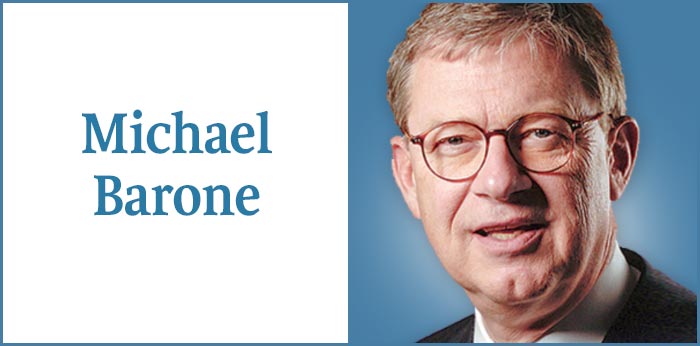“I’m amused,” Attorney General William Barr told CBS News’ Jan Crawford, “by these people who make a living by disclosing classified information, including the names of intelligence operatives, wringing their hands about whether I’m going to be responsible in protecting intelligence sources and methods.”
He went on after further questions: “Well, the media reaction is strange. Normally the media would be interested in letting the sunshine in and finding out what the truth is. And usually the media doesn’t care that much about protecting intelligence sources and methods. But I do, and I will.”
You don’t have to have been “in the business” for Barr’s nearly 50 years to understand what he means. Just flash back 13 years to June 2006 and read The New York Times’ revelations about the Swift bank procedures.
The Belgian-based Swift manages foreign currency transfers, and after 9/11, the CIA and Treasury conducted data searches to spot — and, ultimately, stop — terrorist financing. The Times’ story conceded that this program was successful in obstructing terrorist activity, and it identified no abuses.
Top administration officials pleaded with The Times not to publish the story, and then-President George W. Bush said the publication was “disgraceful.” Times editor Bill Keller’s justification was that “the administration’s” — not the government’s but the administration’s — “extraordinary access to this vast repository of international financial data … is a matter of public interest.”
In other words, The Times didn’t care much about weakening America’s fight against terrorism by disclosing classified information and revealing intelligence sources and methods. It was more interested in letting the sunshine in on a program that, to the best of its knowledge, had infringed no one’s rights.
Some called for prosecution of The Times for violating the Espionage Act of 1917, which criminalizes the publication of classified information, signed by then-President Woodrow Wilson two months after the U.S. entered World War I. But as then-Sen. Daniel Patrick Moynihan pointed out in his 1998 book “Secrecy: The American Experience,” the Espionage Act is overbroad, and government tends to overclassify information, including even newspaper articles.
Accordingly, successive administrations up to and including George W. Bush’s have declined to prosecute news media for publishing stories, including leaks of classified information, that seem clearly forbidden by the words of Wilson’s Espionage Act.
Abandoning that precedent, perhaps surprisingly, was the administration of Barack Obama. He described himself as “a strong believer in the First Amendment” and dismissed “stories about us cracking down on whistleblowers or whatnot” as “a really small sample.”
Actually, they were an unprecedentedly large number. As James Risen, co-byliner on The Times’ original Swift story, wrote in December 2016, the Obama administration “has prosecuted nine cases involving whistleblowers and leakers, compared with only three by all previous administrations combined.”
Obama’s Justice Department subpoenaed Associated Press phone records — of AP trunk lines and 30 separate phones. It identified Fox News reporter James Rosen as a “co-conspirator” in an espionage leak case. The supposedly liberal and pro-First Amendment Obama administration was actively pursuing what the Columbia Journalism Review called “a massive intrusion into newsgathering operations.”
It’s true that Obama did not emit as many tart words for the press in his eight years as president as Donald Trump has in his two and a half. But it’s also true that Trump has come nowhere near to challenging Obama’s record as the president most inclined to sic law enforcement on the press since Woodrow Wilson himself. Liberal Democrats aren’t necessarily the best friends of press freedom.
Nor are they, it seems, friends of a citizen’s right to privacy or a candidate’s right to seek public office without government surveillance. In his testimony before the Senate Judiciary Committee, when Barr made the point that the government “spying” had occurred on the Trump campaign, Democrats and the press expressed horror. You’re not supposed to say “spying,” apparently, even though Democrats and media like The Times have routinely used it as a conveniently short and understandable synonym for surveillance.
As Barr told Crawford, spying is appropriate if it’s “adequately predicated” — and it’s unclear whether the spying on the Trump campaign was. Certainly, the use of the partisan and unverified Steele dossier is not adequate.
Barr is old enough to remember when liberals did not take government legal or intelligence agencies’ word that spying on an administration’s opponents was justified and did not attack those who questioned it as unpatriotic.
He may be amused that such doings are self-righteously justified today, but it’s good that he’s willing to ask questions most of the media don’t want asked, to determine how the Obama law enforcement and intelligence agencies set about spying on the opposite party’s presidential campaign.
[Michael Barone is a senior political analyst for the Washington Examiner, resident fellow at the American Enterprise Institute and longtime co-author of “The Almanac of American Politics.”] COPYRIGHT 2019 CREATORS.COM













Leave a Comment
You must be logged in to post a comment.